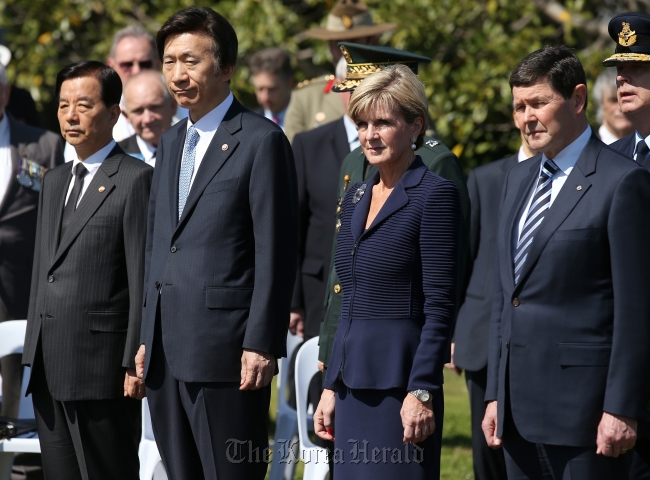S. Korea, Australia to boost defense cooperation
By Shin Hyon-heePublished : Sept. 11, 2015 - 16:36
The foreign and defense ministers of South Korea and Australia pledged to jumpstart high-level strategic dialogue, logistics support and other bilateral and multilateral military partnerships as they unveiled their blueprint for defense and security cooperation in Sydney on Friday.
Foreign ministers Yun Byung-se and Julie Bishop and defense ministers Han Min-koo and Kevin Andrews held the second round of their so-called two-plus-two meeting and explored ways to beef up their defense and security collaboration to better counter regional challenges including together with the U.S., their longtime ally.
Under the vision, the ministers will have annual bilateral and biennial joint talks and work to arrange regular summits in either country or on the margins of international events. The sides also agreed to have strategic dialogue and defense policy talks every year at the deputy minister and director general levels, respectively, and boost military exercises, training and personnel exchanges.
Foreign ministers Yun Byung-se and Julie Bishop and defense ministers Han Min-koo and Kevin Andrews held the second round of their so-called two-plus-two meeting and explored ways to beef up their defense and security collaboration to better counter regional challenges including together with the U.S., their longtime ally.
Under the vision, the ministers will have annual bilateral and biennial joint talks and work to arrange regular summits in either country or on the margins of international events. The sides also agreed to have strategic dialogue and defense policy talks every year at the deputy minister and director general levels, respectively, and boost military exercises, training and personnel exchanges.

The top officials urged Pyongyang to renounce its nuclear ambitions and improve human rights conditions and return to the negotiating table yet “with sincerity,” while calling for an early conclusion of a code of conduct to defuse ongoing rows over islands in the South China Sea between China and some Southeast Asian countries.
“The ministers strongly deplored North Korea’s nuclear and ballistic missile programs, which threaten peace and security of the region and undermine the global nonproliferation regime,” they said in a joint statement.
“(They also) emphasized the importance of exercising self-restraint in the conduct of activities that would complicate or escalate disputes and affect peace and stability.”
The latter clause coincides with growing U.S. pressure on its allies to voice more on the issue. After their consultations in late May in Singapore, the defense ministers of the U.S., Japan and Australia displayed “strong opposition to the use of coercion or force to alter the status quo in the East China and South China Seas unilaterally.” But Seoul appears to have opted to take a more cautious tone given its increasingly deepening ties with Beijing.
On the regional and global front, the blueprint stipulates the two countries’ commitment to work alongside on humanitarian assistance and disaster relief, peacekeeping operations, counterproliferation, transnational law enforcement, cybersecurity, border security, crisis management and maritime safety.
Yun and Han arrived in Sydney earlier in the day. The top diplomat is scheduled to travel from there to New Zealand and Fiji to discuss diplomatic and economic cooperation, while the military chief will visit the Philippines next for bilateral talks with his counterpart.
Both officials are expected to return home on Tuesday.
Seoul and Canberra launched the two-plus-two talks in 2013. Australia is the sole partner for the initiative other than the U.S., and the three countries are seeking to expand their trilateral defense cooperation.
Australia holds the foursome meetings with five other nations: the U.S., the U.K., Japan, Indonesia and Singapore.
By Shin Hyon-hee (heeshin@heraldcorp.com)







![[AtoZ into Korean mind] World of the in-laws, where gender stereotypes persist](http://res.heraldm.com/phpwas/restmb_idxmake.php?idx=644&simg=/content/image/2024/05/09/20240509050173_0.jpg&u=)










![[Herald Interview] TikTok, K-pop are evolving together: TikTok exec](http://res.heraldm.com/phpwas/restmb_idxmake.php?idx=642&simg=/content/image/2024/05/21/20240521050570_0.jpg&u=)